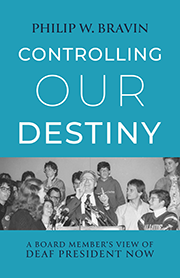A Board Member’s View of Deaf President Now
Philip W. Bravin
Foreword by I. King Jordan
October 2020
| Table of contents Excerpt Interview View the book trailer above |
$27.95 (t) paperback, ebook |
“In this essential telling of a unique perspective of DPN, Bravin reveals the power of Deaf leadership and the quest for self-determination. I hope his book inspires more people to share their stories and insights. We keep moving forward with humility and gratitude for those who paved the way for us.”
“To read Controlling Our Destiny is to be a fly that time travels to 1988 and is on the wall during Gallaudet Board of Trustee deliberations—those that triggered the Deaf President Now movement as well as those that brought it to a favorable end. This book provides an opportunity for readers to gain insights into a part of history previously unavailable to anyone not directly involved in the board deliberations. Phil Bravin does an excellent job of outlining the process by which the presidential search began, moved, and ended—as well as how the board dealt with the aftermath. As Bravin makes clear, the board’s actions unintentionally led to a historic civil rights shift for Deaf people in the USA and around the world, shattering glass ceilings for many Deaf people as well as people with disabilities. This book is also timely in emphasizing that self-representation of any group is an absolute requirement, and that every board director has an obligation to ensure their composition reflects the population they serve.”
“This book provides a unique firsthand account from a former board member of how the Deaf President Now (DPN) movement toppled hearing domination within the deaf community. This will be an important blueprint for readers on how a minority group and marginalized community controlled by the majority liberated themselves from years of oppression to control its own destiny.”
“In Phil Bravin’s marvelous book, we learn about the selection process for a new president at Gallaudet that was chaired by Bravin. Out of 87 candidates, his committee sent three names to the board—two deaf candidates and a hearing candidate. The board, overwhelmingly hearing members, chose the hearing candidate by a 10-4 vote with only one hearing board member voting for the deaf candidate. Bravin, who is also deaf, joined the minority deaf members in voting for I. King Jordan.
Days later, overcoming long odds, Bravin and Jordan were key players in the Deaf President Now (DPN) movement that included students, faculty, staff, alumni, and other civil rights activists to insist on a deaf president, the resignation of the hearing board chair, and a plan for a majority deaf board. The DPN protesters closed the university, marched on the White House and the U.S. Capitol, and told their compelling story to the world. The newly elected hearing candidate withdrew, and Jordan was elected president and Bravin the chair of the board. Jordan and Bravin went on to compile an amazing record of achievements for Gallaudet and the deaf community. Their wisdom and courage was matched by the leadership of the DPN movement and their followers. Together they made history and paved the way two years later for the Americans with Disabilities Act (ADA).”
In March 1988, students at Gallaudet University led a successful protest to demand the selection of the university’s first deaf president. The Deaf President Now (DPN) movement was a watershed event in American deaf history; it achieved self-governance for the deaf community and placed Gallaudet in the center of a national media spotlight. Controlling Our Destiny is Philip Bravin’s personal perspective of these momentous events. A lifelong member of the deaf community and proud Gallaudet alumnus, Bravin was a member of the Gallaudet University Board of Trustees and the chair of the presidential search committee during DPN. Although the deaf community had been strongly advocating for a deaf president to lead the university, the board (which had a hearing majority) selected the lone hearing candidate.
Bravin recounts the discussions and decision-making that happened behind the scenes leading up to and following the ill-fated announcement. He reflects on the integrity of the process and the internal conflict he experienced as a deaf person who supported a deaf president yet felt compelled to abide by his duties as a board member. After the protests, his leadership was recognized when he was selected as the first deaf chair of the board. Photographs and documents add depth to Bravin’s account, many of which will be seen by the public for the first time. I. King Jordan, the first deaf president of Gallaudet, provides a foreword in which he shares his own unique insight into these events.
Controlling Our Destiny captures the energy and the urgency of DPN. Readers will understand the complexities of the presidential search process and the cultural and historical contexts that triggered the protest. Bravin’s memoir contemplates power, access, community, and the enduring legacy of a movement that inspired deaf people around the world.
Philip W. Bravin is Vice President of Product Strategy and Innovation at ZVRS/Purple, a video relay company serving the deaf and hard of hearing community. He has held various positions within the deaf community and in the corporate business community, including executive roles at Communication Service for the Deaf, the National Captioning Institute, and IBM. He is Trustee Emeritus of the Gallaudet University Board of Trustees and holds an honorary doctorate from Gallaudet University.
Paperback
ISBN 978-1-944838-71-3
256 pages. 5½ x 8½. 32 photographs.
$27.95 (t)
Ebook
ISBN 978-1-944838-73-7
$27.95


